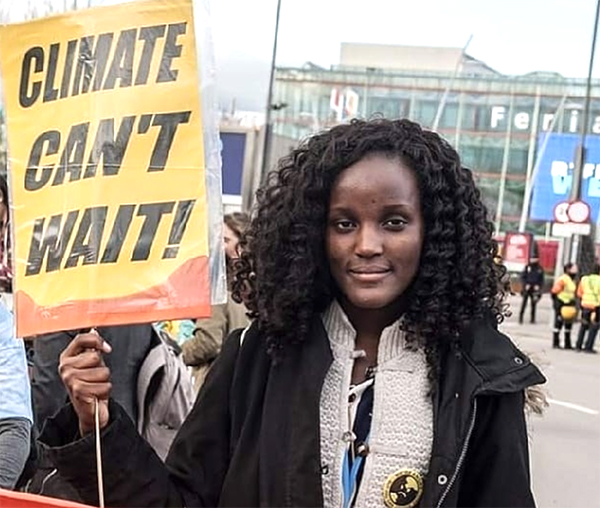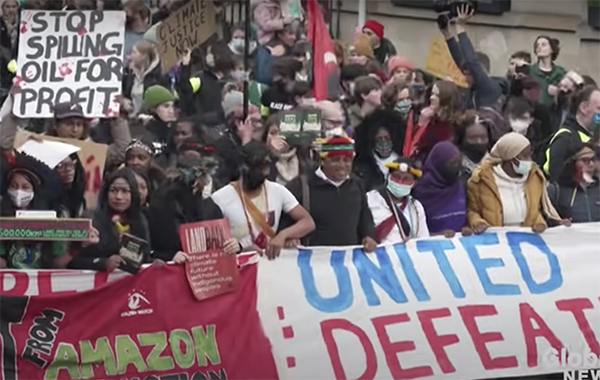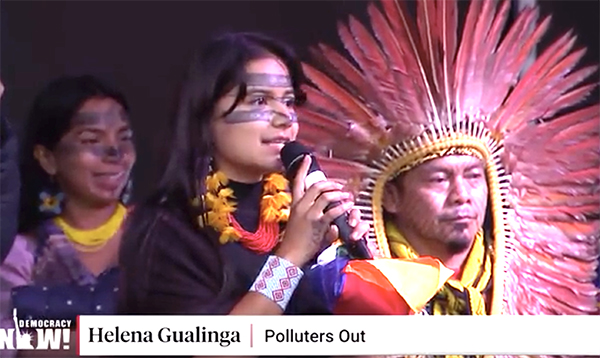At the United Nations Climate Summit in Glasgow (known as the #COP26 conference), Vanessa Nakate, a 24-year-old climate activist from Uganda, warned that, “Commitments will not reduce CO2. Promises will not stop the suffering of the people. Pledges will not stop the planet from warming. Only immediate and drastic action will pull us back from the abyss.”
Throughout the conference tens of thousands of people took to the streets of Glasgow. Indigenous people from around the world, including @ndncollective and @IEN earth (indigenous groups based in North America), led a march of 150,000 people in the freezing Glasgow rain outside the summit. Activists also held a memorial for those unable to attend this year’s conference; the 1,005 land and environmental defenders who have been murdered since the 2015 Paris Agreement. One in three of those defenders killed was an Indigenous person.
As the UN climate summit came to a close, it was clear that the fossil fuel corporations were all over the final draft climate agreement. While the earlier draft of the unbinding Glasgow Agreement called for “phasing-out of coal and subsidies for fossil fuels,” the new draft calls for the phaseout of “unabated coal power and of inefficient subsidies for fossil fuels.” And, according to the International Energy Agency, the pledges coming out of the conference “will not reduce emissions fast enough to keep the world within the crucial limit of 1.5 degrees Celsius by 2100, as agreed to in the Paris climate talks. Instead, the world would be on track for 1.8 degrees Celsius of warming. . .” (NPR).

Photo / Vanessa Nakate, courtesy of Instagram (@vanessanakate1)
In addition, developed countries failed to meet the demands of developing nations for richer countries to help alleviate the suffering from climate destruction, that they did not cause, or to meet their prior commitment to deliver $100 billion annually starting in 2020. Ani Dasgupta, President of the World Resources Institute, stated that richer countries deny this even as they provide hundreds of billions of dollars in subsidies for fossil fuels each year.
In response, climate activists staged a walk-out on the last day. In the words of lead spokesperson Asad Rehman of the COP26 Coalition — a group fighting to bring together movements from across the world to build power for system change: “We should not call it a Glasgow pact, we should call it a Glasgow suicide pact for the poorest in the world. They’re ramming through so many loopholes that it makes a mockery of these climate negotiations.” Rehman was part of a group of members from U.N. constituencies that took over one of the main negotiation rooms inside COP26 this morning to issue a “people’s declaration” in light of the weakened language.
In an interview on “Democracy Now,” Rehman concluded, “We know what needs to be done. We’ve got the plans and policies. We know we need to transform our energy and food system. We need to guarantee people living wages, public services and social protection. We know all the things that we need. And now we need to build the power for it. And all around the world over these last two weeks, what’s been amazing has been the different iterations of people not just saying what’s wrong, but saying this is the world, and this is what we’re going to fight, and this is what we’re going to create. And that’s been the most uplifting thing about this summit.”
Below are voices of indigenous youth and others who declare : “We are not responsible” [for climate change] and demand that world leaders act now. Their voices are excerpts from democracynow.org interviews.
HELENA GUALINGA: “My community [in Ecuador] has been suffering from the oil industry since before I was even born…we are here today to demand justice from the leaders, because we are not responsible…yet most times we are not being heard…behind every murder that happens to a land defender, there is a company behind that…a government behind that…a name behind that. U.S. and European banks are, every day, financing and investing…in the killing of the Amazon and in the killing of the people. There are people actually responsible for this, and we need to hold them accountable.”
ANDREA IXCHIU, journalist and human rights defender based in Guatemala, said that the Guatemalan government, influenced by transnational corporate interests, has launched an assault on Indigenous land defenders: “[Indigenous leaders] are not allowed to be in their communities defending their land and their territory because of the militarization…if you want to create more solutions to the climate crisis, it’s really important to give land back to Indigenous communities.”
RAKI AP, spokesperson for Free West Papua Campaign: “I stand here in full solidarity on behalf of the Indigenous peoples of West Papua…one of the most frontline areas with the most unique land and marine biodiversity…New Guinea…has become a colonized land…having world’s largest gold mine owned by a U.S. mining corporation, BP [British Petroleum] with one of the largest LNG gas projects, and palm oil companies destroying our ancient lands…one of the outcomes of the U.N. IPCC states that just 5% of world’s populations exist of Indigenous communities, [and] have preserved more than 80% of world’s remaining biodiversity. They are the most important stakeholders, who have been ignored at COP26.”
JON BONIFACIO, Southern Peoples’ Action on COP26: “I’m also part of Youth Advocates for Climate Action Philippines and Fridays for Future Most Affected Peoples and Areas…just a bus ride away from here, world leaders are talking about youth empowerment in addressing climate change…yet, we, the youth from the Global South, alongside so many more of the most impacted peoples of the world, are here…because we have been excluded, peoples who have fought tooth and nail to get here to Glasgow, while billionaires and fossil fuel CEOs coming in their private jets and super yachts get to speak at COP and lecture us on how to save the planet. The Philippines is one of the most impacted countries when it comes to the climate crisis. I have witnessed first-hand…floods reaching the roofs of two, three-story buildings, lives and livelihoods erased overnight. On top of this, our president, Rodrigo Duterte, is cracking down on environmental activism, calling for the massacre of Indigenous Lumad peoples, other land and environment defenders, and shutting down climate activists by calling us terrorists. It’s no wonder that the Philippines has remained the deadliest country in Asia for eight consecutive years…each second these world leaders delay action towards global mitigation and adaptation condemns billions across the world to an unlivable future.”
RAMÓN MEJÍA, Grassroots Global Justice Alliance organizer and Iraq War veteran: “There can’t be any genuine discussion about addressing climate change if we’re not including the military…the largest consumer of fossil fuels and largest emitter of greenhouse gases most responsible for the climate disruption. So, when you have fossil fuel industries that have a larger delegation than most of our frontline communities and the Global South, then we’re being silenced. This space is not a space for genuine discussions. It’s a discussion for transnational corporations and industry and polluting governments to continue to try and find ways to go as business as usual without actually addressing the roots of the conversation…The genuine discussions and the real change is happening in the streets with our communities and our international movements that are here to not only discuss but apply pressure…COP is…the convening of profiteers.” ERIK EDSTROM, Afghan War vet and author: “The emissions attributable to the U.S. military is more than civilian aviation and shipping combined. But one of the things I really wanted to drive home…is the social cost of carbon or the negative externalities associated with our global boot-print as a military around the world…the 1.2 billion metric tons of estimated emissions from the military during the time of the global war on terror… has potentially caused up to 270,000 climate-related deaths around the globe.”



